

Re:publica 2012 - Rick Falkvinge - Working swarm-wise. Swarmwise Chapter 6. The swarm must have mechanisms for conflict resolution, for decision making, and for reward culture.
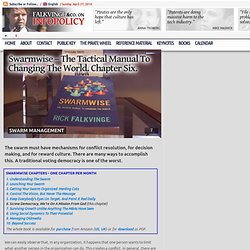
There are many ways to accomplish this. A traditional voting democracy is one of the worst. We can easily observe that, in any organization, it happens that one person wants to limit what another person in the organization can do. This creates a conflict. In general, there are four ways to resolve this situation. Swarmwise Chapter 7. Following a high-profile event, your swarm just tripled in size in a week.
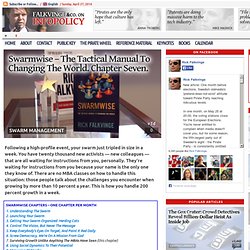
You have twenty thousand new activists — new colleagues — that are all waiting for instructions from you, personally. They’re waiting for instructions from you because your name is the only one they know of. There are no MBA classes on how to handle this situation: those people talk about the challenges you encounter when growing by more than 10 percent a year. This is how you handle 200 percent growth in a week. On May 31, 2006, the Swedish police conducted a vastly overforceful raid against the Pirate Bay, creating tons of collateral damage and constitutional violations. (We would have more than tripled if our servers had been able to handle the influx of new members. Book Launch: "Swarmwise" - The Tactical Manual To Changing The World.
After four years of work, the leadership book “Swarmwise” is finally published.

It is a book filled to the brim with the experience from leading the Swedish Pirate Party from zero into the European Parliament, spreading the movement to 70 countries, and most importantly, beating the competition on less than one percent of their budget – being over two orders of magnitude more cost-efficient. It is available as a paperback and a PDF, with more formats to come. Yesterday afternoon, I hit the “publish” button, and as of this morning, the book is available on Amazon (US, UK, DE, FR). It is also available as a PDF for free sharing (download). Swarmwise Chapter 4. People’s friends are better marketers toward those people than you, for the simple reason that they are those people’s friends, and you are not.
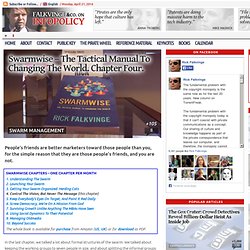
In the last chapter, we talked a lot about formal structures of the swarm. We talked about keeping the working groups to seven people in size, and about splitting the informal groups that approach 150 people in size into two groups. This kind of advice will have come as a surprise to some, who would believe and maybe even insist that a swarm must be leaderless and fully organic. I do not believe in leaderless organizations. We can observe around us that change happens whenever people are allowed to inspire each other to greatness. In contrast, if you have a large assembly of people who are forced to agree on every movement before doing anything, including the mechanism for what constitutes such agreement, then you rarely achieve anything at all.
Swarmwise Chapter 5. Anybody who has led guilds or raids in World of Warcraft can learn how to lead a swarm.
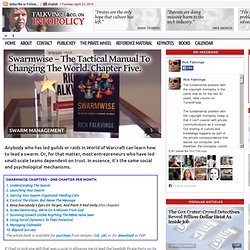
Or, for that matter, most entrepreneurs who have led small-scale teams dependent on trust. In essence, it’s the same social and psychological mechanisms. If I had to pick one skill that was crucial in allowing me to lead the Swedish Pirate Party on its journey from two lines in a chat channel to taking seats in the European Parliament, it would be skills and experience in project management. Swarmwise Chapter 3. While the effective swarm consists almost entirely of loosely knit activists, there is a core of people — a scaffolding for the swarm — that requires a more formal organization.

It is important to construct this scaffolding carefully, paying attention to known facts about how people work in social groups. Without it, the swarm has no focal point around which it can… well, swarm. If the last chapter was about the first six to eight days of the swarm’s lifecycle, this chapter is about the first six to eight weeks. In building this scaffolding of go-to people, of the swarm’s officers, it is your responsibility to be aware of limits to group sizes that prevent further growth once reached, and break up the groups that reach these sizes into smaller subgroups when that happens. You also need to be aware that any organization copies the methods and culture of its founder.
Swarmwise Chapter 2. Launching a swarm is an intense event, where you can get hundreds or thousands of new colleagues in less than a day.
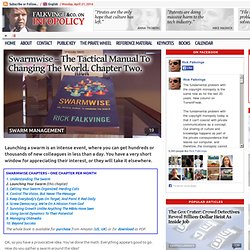
You have a very short window for appreciating their interest, or they will take it elsewhere. OK, so you have a provocative idea. You’ve done the math. Everything appears good to go. Swarmwise Chapter 1. Somewhere today, a loose-knit group of activists who are having fun is dropkicking a rich, established organization so hard they are making heads spin.
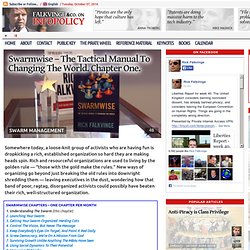
Rich and resourceful organizations are used to living by the golden rule — “those with the gold make the rules.” New ways of organizing go beyond just breaking the old rules into downright shredding them — leaving executives in the dust, wondering how that band of poor, ragtag, disorganized activists could possibly have beaten their rich, well-structured organization. On June 7, 2009, the Swedish Pirate Party got 225,915 votes in the European elections, becoming the largest party in the most coveted subthirty demographic. Our campaign budget was fifty thousand euros. Our competitors had spent six million. Swarm intelligence. Should Pirate Parties Include The Coming Swarm Economy As Policy? The job market is never going back to lifetime employments.

Industry-critical work such as free software or Wikipedia is not counted as value at all. Today’s economic model has failed at reflecting real value and at promoting industry-critical fundamentals. Job policy and economic policy is based on this faulty model. Are the Pirate Parties the right catalyst to change this? Apart from the growth of the information society, there is a parallel and strongly related development happening on the job market.
Just as frequently, the nonprofitable job is a value-enabler of epic proportions, such as editing Wikipedia or contributing free software code to the world. There is an obvious and strong and growing disparity here between reality and the political model which is used to establish policy. The industrial model is dead and it is not coming back. The Iron Law of Wages is being dissolved: currently, no employment can pay less than the minimum required to pay food and rent. How a Swarm of Pirates Can Redefine Politics According to Rick Falkvinge.